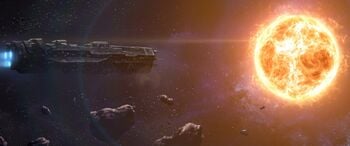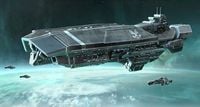UNSC carrier: Difference between revisions
From Halopedia, the Halo wiki
(consistency) |
mNo edit summary |
||
| Line 1: | Line 1: | ||
{{Status|Canon}} | {{Status|Canon}}= | ||
[[File:TFoR-as-Atlas.jpg|350px|thumb|{{UNSCShip|Atlas}}, a UNSC heavy carrier near the yellow dwarf star [[Lambda Serpentis system|Lambda Serpentis]].]] | [[File:TFoR-as-Atlas.jpg|350px|thumb|{{UNSCShip|Atlas}}, a UNSC heavy carrier near the yellow dwarf star [[Lambda Serpentis system|Lambda Serpentis]].]] | ||
'''Carrier''' is a [[capital ship|capital]] [[warship]] [[UNSC starship|classification used]] by the [[UNSC Navy]].{{Ref/Book|Id=Enc22|Enc22|Page=126}} It is used for transport and deployment of fighters and ground troops and command and control{{Ref/Reuse|Enc22}} | '''Carrier''' is a [[capital ship|capital]] [[warship]] [[UNSC starship|classification used]] by the [[UNSC Navy]].{{Ref/Book|Id=Enc22|Enc22|Page=126}} It is used for transport and deployment of fighters and ground troops and command and control{{Ref/Reuse|Enc22}} | ||
Revision as of 22:32, October 27, 2022
=
Carrier is a capital warship classification used by the UNSC Navy.[1] It is used for transport and deployment of fighters and ground troops and command and control[1]
Overview
UNSC carriers range from light warships to among the largest ships in service. The smallest light carriers can be lower than a kilometer from stem to stern, smaller than a cruiser,[2] while the largest carriers are multiple kilometers long.[3] Most carriers are crewed by hundreds to thousands and can carry numerous space, air, and ground vehicles.[3][4] Befitting their role, their primary asset is a large number of space fighters or dropships.[4]
Armament
Despite their size, UNSC carriers depend on their fighter wings for offense, though the heavy carriers are often equipped with at least one Magnetic Accelerator Cannon. Carriers also mount numerous point-defense guns, such as the M910 Rampart point defense network used by the Epoch-class, as well as several nuclear missiles of various types.[1]
Classes
The Navy operates several carrier classes.[Note 1]
- Light carriers
- Poseidon-class light carrier – Sleek, elongated, and somewhat cylindrical in general shape. Its structure comprises two main sections covered with white plating; in the fore section, the plating mostly covers the vessel's dorsal surface.
- Heavy carriers
- Epoch-class heavy carrier – The heaviest variety of carrier in service behind only the immense supercarriers, the Epoch class' tonnage exceeds that of both the Poseidon and the Orion classes. Often forming the core of most UNSC fleets, the heavy carrier is capable of taking extreme damage in combat.
- Orion-class assault carrier – Considered state-of-the-art when it was introduced, the Orion-class assault carrier incorporated the miniaturized and reconfigurable automated factories and chemical processors that were commonly found in colony support vessels, allowing the carriers to produce fuel, spare parts, and rarely even complete combat vehicles without outside assistane.
- Supercarriers
- Infinity-class supercarrier – Currently the largest warship class in the UNSC Navy.
- Punic-class supercarrier – Used for direct confrontation with Covenant capital ships, and one of the few UNSC ships effective in this role.
- Other
- Phoenix-class support vessel – A colony ship classification used by the Unified Earth Government. At least one Phoenix, the UNSC Spirit of Fire, was modified for wartime use by the United Nations Space Command and redesignated a Phoenix-class support vessel.
Unidentified classes
There is also an unidentified model of UNSC carrier, which has a length of 3,000 meters (9,800 ft) and have a beam of 120 meters (390 ft).[3] They are armed with one Magnetic Accelerator Cannon. Secondary armament is provided by 300 Archer missiles, while tertiary armament includes two fusion rockets.[3] They do carry approximately 2,100 and a large number of GA-TL1 Longsword interceptors or Pelican dropships.[3] One, the UNSC Magellan, is part of this class.
There is another unspecified model of UNSC carrier, in which UNSC Musashi belonged to prior to its destruction during the space engagements over Reach.
- UNSC Musashi.jpg
An unidentified carrier class, to which the UNSC Musashi belonged to.
Service history
 This section needs expansion. You can help Halopedia by expanding it.
This section needs expansion. You can help Halopedia by expanding it.
Ships of the line
| Class | Fleet or last known tactical grouping | Ship Name | Hull classification symbol | Last known captain | Notes |
|---|---|---|---|---|---|
| Epoch-class heavy carrier | Unknown | UNSC Epoch | Lead ship | ||
| UNSC Atlas | |||||
| Infinity-class supercarrier | Expeditionary Strike Group 1 | UNSC Infinity | INF-101 | Thomas Lasky | Lead ship. Missing over Installation 07. |
| Unknown | UNSC Eternity | Not Completed | |||
| Orion-class assault carrier | Unknown | UNSC Fifth Winter | |||
| UNSC Orion | Lead ship | ||||
| Phoenix-class carrier | Third Fleet | UNSC Spirit of Fire | CFV-88 | James Cutter | Active but officially listed as lost with all hands. |
| Poseidon-class light carrier | Unknown | UNSC Milwaukee | |||
| UNSC Poseidon | Lead ship | ||||
| Punic-class supercarrier | Unknown | UNSC Punic | Lead ship | ||
| Epsilon Eridani Fleet | UNSC Trafalgar | Flagship of Epsilon Eridani Fleet. Destroyed over Reach | |||
| Unknown | UNSC Home Fleet | UNSC Stalingrad | Carl Patterson | ||
| UNSC Witness | |||||
| Third Fleet | UNSC Totem Lake | CVA-92 | |||
| Unknown | UNSC All Under Heaven | ||||
| UNSC Magellan | |||||
| UNSC Musashi |
List of appearances
- Halo: The Fall of Reach (First appearance)
- Halo: Ghosts of Onyx
- Halo: Legacy of Onyx
- Halo: Evolutions
- Halo: Fall of Reach
- Halo: The Fall of Reach - The Animated Series
- Halo: Outpost Discovery
- Halo 4
- Halo: Legacy of Onyx
Notes
- ^ The Atlas as seen in Halo: Fall of Reach - Boot Camp and the Musashi as seen in Fall of Reach - Invasion do not appear to belong to any of the established carrier classes. The former shares design features with the Phoenix-class colony ship and the Epoch-class carrier while the latter vaguely resembles the Halberd-class light destroyer. The Atlas was later depicted in Halo: The Fall of Reach with a completely different design reminiscent of the Punic-class supercarrier; while the newer depiction is presumably the ship's canonical appearance, the prior incarnation may nonetheless represent a canonically distinct class.
Sources
- ^ a b c Halo Encyclopedia (2022 edition), page 126
- ^ Halo Waypoint: The Halo Bulletin 5.14.14
- ^ a b c d e Halo Encyclopedia (2009 edition), page 249
- ^ a b Halo: Warfleet, page 40-41
- ^ Halo: Evolutions - Essential Tales of the Halo Universe, "The Impossible Life and the Possible Death of Preston J. Cole", pages 476-487
| ||||||||||||||||||||||||||||||||||||||||||||||||||||||||





